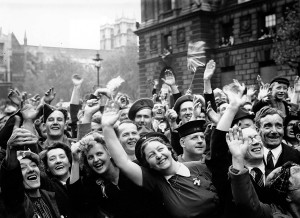V-E Day Revisited
May 7, 2015
Tomorrow, May 8, 2015, marks the 70th anniversary of the announcement of Germany’s surrender during World War II (1939-1945). So momentous was that day in 1945 that United States President Harry Truman proclaimed May 8 as Victory in Europe Day, or V-E Day.

Crowds of Londoners in high spirits on V-E Day after Prime Minister Winston Churchill’s speech, in Whitehall. Credit: © Popperfoto/Getty Images
The German surrender ended fighting in Europe, and it actually occurred the day before, on May 7, 1945. Adolf Hitler had committed suicide. Millions of people were dead worldwide. Soviet troops were in Berlin. Massive Allied armies had taken most of western Germany, and most German cities lay smoldering and in ruins. Germany had no choice but to surrender. Colonel General Alfred Jodl—the chief of staff of the German Armed Forces High Command—signed the surrender at 2:41 a.m. on May 7 in Reims, France. Expecting better treatment from the western Allies rather than the Soviet Union, Jodl surrendered to U.S. Army General Dwight D. Eisenhower. The German troops who surrendered to American, British, Canadian, French, or other western Allied troops did fare better than those captured by the Soviets, but it didn’t do Jodl much good. An avid Nazi and Hitler supporter, Jodl was executed for war crimes in 1946.
The end of the fight in Europe was a joyous occasion, people in the United Kingdom, the United States, and across the world took to the streets to celebrate. World War II still raged in the Pacific, however. The bloody fight for Okinawa dragged late into June 1945, and Allied warplanes continued to attack and bomb Japanese cities, culminating with the dropping of atomic bombs on Hiroshima and Nagasaki in August. Fighting in the Pacific (and in World War II) ended on August 14, but the official Japanese surrender came on September 2—Victory over Japan Day, or V-J Day.
Some of the events in the United Kingdom commemorating tomorrow’s anniversary include a service in Whitehall at the Cenotaph in London—the Cenotaph is a monument honoring the dead of both world wars. At 3 p.m., the U.K. will observe two minutes of silence to mark the moment when British prime minister Winston Churchill broadcast his historic speech announcing the end of fighting in Europe. On Friday evening, a chain of more than 100 beacons will be lit across the U.K. In the United States, aircraft of World War II vintage will fly over the nation’s capital. Ordinarily, aircraft are not allowed to fly so closely over capital buildings, but tomorrow, 15 aircraft formations will fly over the Lincoln Memorial and the National World War II Memorial, and past the Washington Monument.
Other articles and links:


